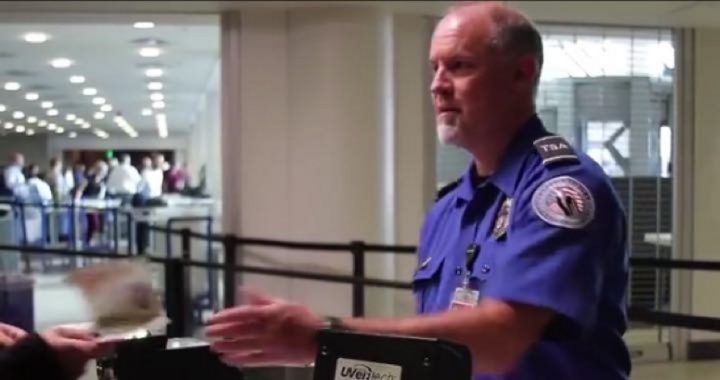
During a series of recent undercover tests conducted by the Department of Homeland Security (DHS) at TSA airport security checkpoints, the screenings failed to detect weapons or explosives, materials that DHS inspectors managed to smuggle through more than half the time.
The Department of Homeland security said its inspectors “identified vulnerabilities with TSA’s screener performance, screening equipment, and associated procedures,” ABC News reported.
Members of the House Committee on Homeland Security were provided with details about the security failures by the DHS’s Office of Inspector General (OIG) and the TSA administrator in a classified briefing on November 8.
Committee Chairman Michael McCaul (R-Texas) said in a statement posted on the committee’s website after the hearing:
We have just been briefed in a classified setting by the DHS Inspector General and Administrator David Pekoske about specific vulnerabilities to our aviation security. Quite frankly, I found that briefing disturbing. We need to do more to confront the growing threats aimed at the aviation sector. I want to work with you so we can remedy the situation as soon as possible and I am hopeful TSA is successful with implementing the eight recommendations that should improve screening checkpoint operational effectiveness.
McCaul also reminded the public that the information shared and exchanged in the briefing must remain classified. He noted that while we are 16 years past the 9/11 attacks that claimed the lives of almost 3,000 people, we are only 9 days past the latest terror attack to hit downtown New York. He stated: “While the latest attack was carried out with a truck instead of an airplane, it was a reminder that the threats we face are real.”
ABC News reported that Representative Mike Rogers (R-Ala.) told TSA Administrator David Pekoske, “This agency that you run is broken badly, and it needs your attention.”
Pekoske said in a statement quoted by NBC News, “We take the OIG’s findings very seriously and are implementing measures that will improve screening effectiveness at checkpoints.”
“We are focused on staying ahead of a dynamic threat to aviation with continued investment in the workforce, enhanced procedures, and new technologies,” Pekoske continued.
The TSA said in the statement that the classified briefing was “to discuss the results of the most recent OIG covert testing at airport security checkpoints,” NBC reported. The agency also stated that it “concurs with the DHS OIG findings and is committed to aggressively implementing the recommendations.”
A CBS News report said that members of Congress and the TSA both support replacing old check point scanners with new CT (computed tomography) scanners. “In this system, we use high power algorithms to detect explosives,” the report quoted Mark Laustra of Analogic, a company developing the technology.
Pekoske told members of Congress the CT technology is the most effective way to keep passengers safe, but the cost is a major hurdle.
“To invest in the CT technology requires funding above what TSA currently has,” Pekoske said.
CBS News reported that the TSA launched a pilot program this past summer using CT scanners, a year behind schedule. The agency announced last week that it would invest an addition $4 million in the technology. American Airlines bought some of the machines to speed up their deployment.
A notice posted on the TSA website last July said that TSA is demonstrating CT scanners at an airport security checkpoint. It explained that CT equipment aims to enhance threat detection capability by providing a three-dimensional image that can be viewed and rotated for a more thorough analysis. The notice said:
In partnership with American Airlines, TSA is conducting the demonstration through its Innovation Task Force at one checkpoint lane at Phoenix Sky Harbor International Airport (PHX). This partnership is the first to launch this state-of-the-art technology. An additional demonstration will also take place at a checkpoint lane at Logan International Airport (BOS) later this month.
Perhaps the one saving grace of moving to advanced technology in the screening process is that it might make personally intrusive searches such as pat-downs unnecessary. However, so long as the agency continues to utilize security scanners using X-rays for passenger screening (the so-called “X-rated” scanners that allow agents to view passengers’ bodies under their clothing) the flying public will still lack privacy.
The TSA was established in the wake of the September 11, 2001 terrorist attacks, with the stated goal of preventing a repetition of those hijackings, but from the beginning, it went about its task in a manner that violated the privacy of every passenger, instead of selectively targeting passengers who posed a high risk. If the agency did a better job in prescreening passengers, sharing information with other agencies — such as U.S. Citizenship and Immigration Services (USCIS), U.S. Immigration and Customs Enforcement (ICE), and U.S. Customs and Border Protection (CBP) — it could identify potential terrorists before they even got to the security area. It makes little sense to subject grandmothers from Des Moines to the same rigid procedures that might be appropriate for young male aliens from the Middle East.
Americans meekly accepted the inconvenience and indignities associated with the TSA’s screening because they believed such actions were necessary for their safety. But as this latest report of TSA’s failure in performing that function indicates, even after enduring the unpleasant screening process, we still are not safe.
We might remember the words Benjamin Franklin once said: “Those who would give up essential Liberty, to purchase a little temporary Safety, deserve neither Liberty nor Safety.”
Image: Screenshot of a TSA video
Related articles:
TSA Now Searching Passengers’ Books and Other Printed Material
TSA Allowed People with Criminal Records to Get Airport Security Badges



